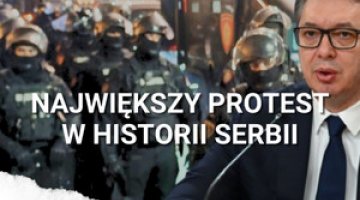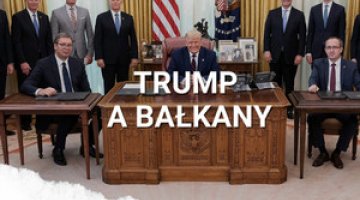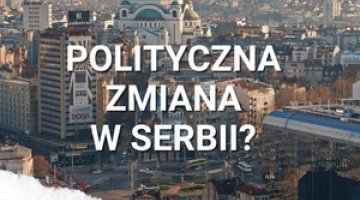Protests in Serbia – playing for a crisis
Over ten thousand people have been taking to the streets in Serbia every weekend since November 2018. The protesters are demanding dismissal of the government and the president, democratisation of the political system and for free elections to be held. The government has taken a wait-and-see stance: refusing to talk to the protesters and hoping that the demonstrations gradually fizzle out. In turn, opposition parties, which are making efforts to bolster the already weakening demonstrations, are playing an increasing role inside the protest movement which initially was a grassroots initiative of activists. Clashes between the police and the demonstrators were seen on 16 March in Belgrade, and the leaders of the opposition parties, along with a group of protesters, forced their way into the buildings of the national television station RTS and had to be removed from there by the police. The opposition is probably hoping that such actions will provoke the government to brutally pacify the demonstrations, which would enable them to present the Serbian regime as undemocratic. The European Commission, commenting on the developments in Belgrade, claimed that the right to hold peaceful demonstrations is one of the pillars of democracy but added that it is parliament that should be the place for political discussions. Thus it suggested that the scenario of a change in government as a result of street protests is undesirable for the European Commission. Most EU member states view negotiating a compromise between Serbia and Kosovo as a priority of their policy in the Balkans, and President Aleksandar Vučić is perceived as a guarantor of stability.
The background and the character of the protests
The demonstrations began in autumn 2018 as a reaction to the physical assault of an opposition politician by unidentified perpetrators. Initially the protesters demanded above all that the use of violence against opposition politicians and journalists should stop. The accusations of intimidating political opponents and using the state apparatus for this purpose have been directed above all to the governing Serbian Progressive Party (SNS). The escalation of the protests was provoked by President Vučić himself, who said that he would not satisfy the demands of the demonstrators even if their number reached five million (the population of Serbia is seven million). This claim was received as a manifestation of the arrogance of the government elite who disregard the expectations of the public, and the slogan ‘One in five million’ has become the main slogan of the political opposition. At present, the demonstrators are already demanding the dismissal of the president and government and the appointment of a technical cabinet which will guarantee the conditions for holding a democratic election.
According to the demonstrators, the government has subordinated the operation of state institutions to party interests and has been holding onto power owing to a complex system of clientelist connections. The large number of members of the main government party, SNS, is a measure of its scale. Around 730,000 people, i.e. over 10% of the country’s population, belong to this party because SNS membership guarantees employment in the public sector. This system is also beneficial for oligarchs who support the government and control the media sector (amongst others), which makes it very difficult for the opposition to reach the public.
The opposition enters the game
Initially the protests were a grassroots initiative and attracted representatives of a great variety of circles – from liberals to nationalists. Over time, opposition politicians began playing an increasing role in holding the protests. The core of the opposition forces in Serbia is formed by the Alliance for Serbia; this brings together political parties with very different agendas but which are united by the goal of removing SNS from power. Most of them are groupings that originated from the Democratic Party, under whose government Serbia made major progress on its way to integration with the EU in the 2000s. Nationalist and pro-Russian parties also have strong representation. In February 2019, the opposition announced a document entitled ‘Agreement with the People’ in which most of the protesters’ demands were taken into account, and began boycotting the parliament. As the opposition is gradually taking control of the protests, these are becoming increasingly radicalised. One manifestation of this was the confrontation with the police on 16 March provoked by opposition leaders with the intention of maintaining public interest in the protests. At the same time, the leader of the nationalist and pro-Russian party Dveri, Boško Obradović has become the face of the protests as a result of the incident in the television building; this has led to a major section of the liberal elite becoming less willing to continue its engagement in the demonstrations.
The government is playing for time
The government has only made some tactical concessions in response to the protests. A few of the most controversial officials suspected of corruption have been dismissed. The government has been discouraging citizens from participating in the protests but has also categorically refused to open dialogue with the opposition. President Vučić is most likely planning to announce a snap parliamentary election this spring and hopes that its outcome will be a confirmation of the public mandate for his political camp. The government does not need to be concerned about the election result in a situation where it controls the state apparatus and most of the media, and may count on the loyalty of a great section of the public who owe their jobs to the governing party. SNS’s victory in the election would undermine the credibility of the protest movement and refute the argument that the demonstrations represent a majority of the public. The need to renew the government’s mandate before the launch of final negotiations to normalise relations with Kosovo (which have been conducted under the auspices of the EU since 2011) will most likely be used as a pretext for announcing the election. In February this year, the president initiated a series of visits to all Serbian constituencies under the slogan ‘The Future of Serbia’ as a herald of SNS’s election campaign.
The West: stability above all
Most EU member states and the USA view the negotiation of a deal that will normalise relations between Belgrade and Pristina as the priority in their policy towards Serbia. The dialogue between Serbia and Kosovo is currently suspended. However, after the EU institutions have been formed after the election to the European Parliament in May this year, the parties will most likely resume the talks. In the West’s opinion, Vučić is currently the only Serbia politician to guarantee the continuation of the dialogue with Kosovo. Western countries active in the Balkans do see the erosion of the rule of law in Serbia (which is confirmed by international rankings, including that of the Freedom House), but they fear any radical internal changes that might pose a threat to the region’s stability.




